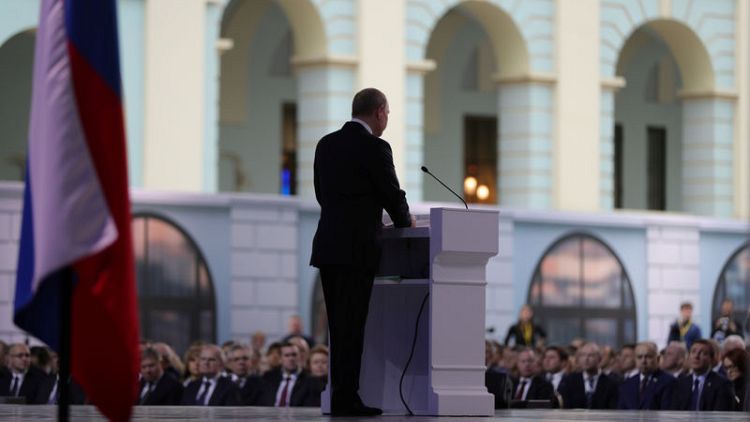By Andrew Osborn and Katya Golubkova
MOSCOW (Reuters) - Moscow will match any U.S. move to deploy new nuclear missiles closer to Russia by stationing its own missiles closer to the United States or by deploying faster missiles or both, President Vladimir Putin said on Wednesday.
In Washington, the U.S. State Department dismissed Putin's comments as "propaganda designed to divert attention from what Washington alleges are Moscow's violations of the Intermediate-range Nuclear Forces (INF) Treaty.
Putin said Russia was not seeking confrontation and would not take the first step to deploy missiles in response to Washington's decision this month to quit a landmark Cold War-era arms control treaty.
But in his toughest remarks yet on a potential new arms race, he said Russia's reaction to any deployment would be resolute and that U.S. policymakers, some of whom he accused of being obsessed with U.S. exceptionalism, should calculate the risks before taking any steps.
"It's their right to think how they want. But can they count? I'm sure they can. Let them count the speed and the range of the weapons systems we are developing," Putin told Russia's political elite to strong applause.
"Russia will be forced to create and deploy types of weapons which can be used not only in respect of those territories from which the direct threat to us originates, but also in respect of those territories where the centres of decision-making are located," he said.
"These weapons, by their tactical and technical specifications, including their flight time to the command centres I’m talking about, will fully correspond to the threats that will be directed against Russia."
The U.S. State Department said Washington was not developing "exotic new nuclear weapons delivery systems" and repeated its claim that Russia violates the INF treaty while the United States does not.
"President Putin’s remarks are a continuation of Russia’s propaganda effort to avoid responsibility for Russia’s actions in violation of the INF Treaty," added a State Department spokeswoman on condition of anonymity.
Russian nuclear missiles already target the United States and vice versa.
Putin's statement is likely to evoke memories of the Cuban Missile Crisis in 1962 when the then Soviet Union responded to a U.S. missile deployment in Turkey by sending ballistic missiles to Cuba, sparking a standoff that brought the world to the brink of nuclear war.
Washington said this month it was suspending its obligations under the 1987 INF treaty because of what it said were Moscow's violations, starting the process of quitting it and untying its hands to develop new missiles.
FLIGHT TIME
Any U.S. move to place new missiles in Europe would cut the time it took some U.S. missiles to reach Moscow to 10-12 minutes, Putin said, something he called a serious threat.
Such a scenario, if left unmatched, would open up the possibility of Russia being hit by a nuclear strike before its own missiles fired in response could reach U.S. territory.
The Russian land-based missiles that currently target the United States are based on Russian territory and therefore the flight time to major U.S. population centres would be longer than for U.S. missiles deployed in Europe.
Putin did not confirm how, technically, Russia would deploy missiles with a shorter strike time. Possible options include deploying them on the soil of an ally near U.S. territory, deploying faster missiles on submarines, or using one of the hypersonic weapons Moscow says it has under development.
In his speech on Wednesday, Putin said that a submarine capable of carrying a new underwater drone with nuclear strike capability, which is called Poseidon, would be launched this spring, and also spoke of the successful development of a new hypersonic missile called Tsirkon.
Russian state television on Wednesday broadcast footage of Poseidon being tested for the first time, the RIA news agency reported.
TREATY WITHDRAWAL
The INF Treaty banned Russia and the United States from stationing short- and intermediate-range, land-based missiles in Europe and its demise raises the prospect of a new arms race between Washington and Moscow, which denies flouting the treaty.
Putin responded to the U.S. move by saying Russia would mirror Washington's actions by suspending its own obligations and quitting the pact.
But the Russian leader, who has sometimes used bellicose rhetoric to talk up Russia's standoff with the West, did not up the ante.
He did not announce new missile deployments, said money for new systems must come from existing budget funds and declared that Moscow would not deploy new land-based missiles in Europe or elsewhere unless Washington did so first.
On Wednesday, he made clear however that he was ready, reluctantly, to escalate if the United States escalated and that Russia was continuing to actively develop weapons and missile systems to ensure it was well prepared for such an eventuality.
Putin said Russia wanted good ties with the United States, but was ready with its defensive response if necessary.
"We know how to do this and we will implement these plans immediately, as soon as the corresponding threats to us become a reality."
(Additional reporting by Polina Nikolskya, Tom Balmforth and Vladimir Soldatkin in Moscow and by Arshad Mohammed in Washington; Writing by Andrew Osborn; Editing by Raissa Kasolowsky and James Dalgleish)
